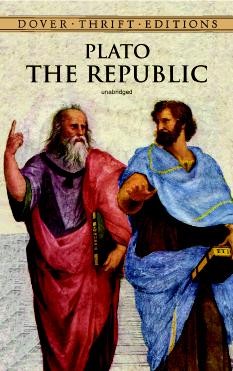| The Republic Contributor(s): Plato (Author) |
|
 |
ISBN: 0486411214 ISBN-13: 9780486411217 Publisher: Dover Publications OUR PRICE: $7.20 Product Type: Paperback - Other Formats Published: April 2000 Annotation: Famous philosophical treatise of the 4th century BC concerns itself chiefly with the idea of justice, as well as such Platonic theories as that of ideas, the criticism of poetry, and the philosopher's role. Source of the famous cave myth and prototype for other imaginary commonwealths, including those of Cicero, St. Augustine, and More. Benjamin Jowett translation. |
| Additional Information |
| BISAC Categories: - Philosophy | History & Surveys - Ancient & Classical - Philosophy | Political - Political Science | History & Theory - General |
| Dewey: 321.07 |
| LCCN: 99056941 |
| Lexile Measure: 1060 |
| Series: Dover Thrift Editions |
| Physical Information: 0.68" H x 5.18" W x 8.26" (0.48 lbs) 288 pages |
| Themes: - Chronological Period - Ancient (To 499 A.D.) - Cultural Region - Greece |
| Descriptions, Reviews, Etc. |
| Publisher Description: Often ranked as the greatest of Plato's many remarkable writings, this celebrated philosophical work of the fourth century B.C. contemplates the elements of an ideal state, serving as the forerunner for such other classics of political thought as Cicero's De Republica, St. Augustine's City of God, and Thomas More's Utopia. |